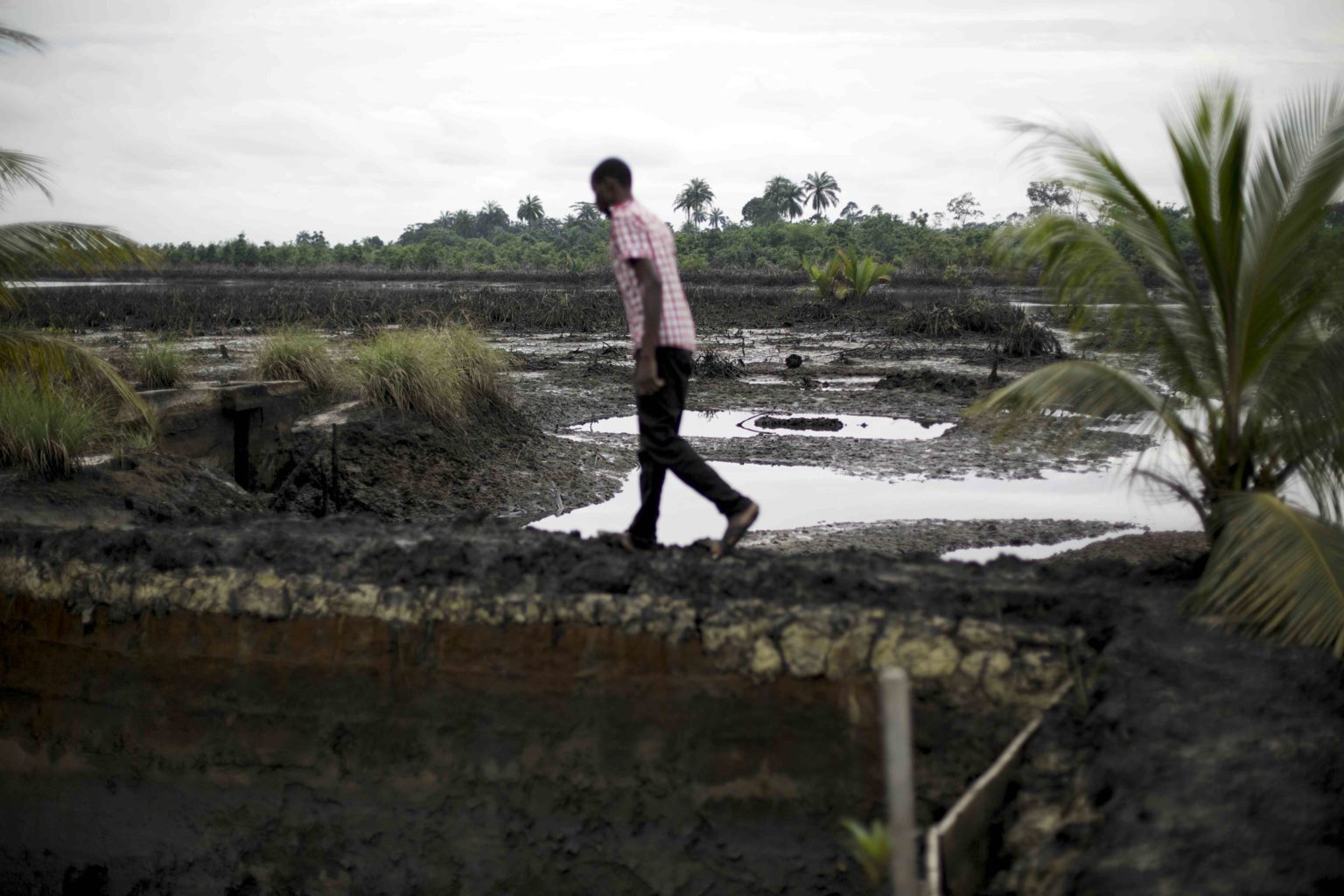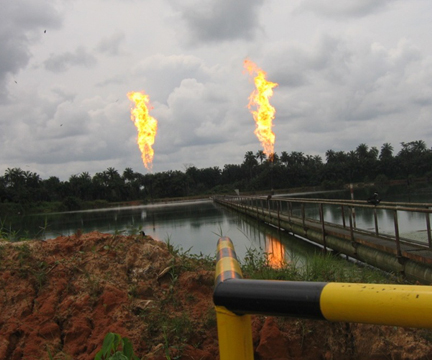In 2016, Nigeria reclaimed its position as Africa’s largest oil producer and remains one of the countries with the largest oil reserves in the world, including in the deepwater off the Nigerian coast.
Oil exploitation in Nigeria goes back a long way. Shell first discovered oil in the Niger Delta region in the mid 1950s with production starting in 1958.
Since then, the Niger Delta has been associated with industrial oil exploitation. It was put on the map when two major oil spills by oil giant Shell in 2008 and 2009 caused extensive pollution, ravaged the environment and destroyed the livelihoods of the local fishing and farming communities. To this day, the clean-up has not been completed.
READ MORE ABOUT DESMOG UK‘S REPORTING ON THE NIGER DELTA HERE.
Sirius Petroleum’s Ororo field is located in the shallow waters of the Ondo State, one of the nine states which make up the Niger Delta region.
According to Sirius, the field was first discovered by oil giant Chevron in 1986 and is described as a marginal field.
Marginal fields are oil fields with established oil reserves that have been underdeveloped or unexploited for a long time. This can be because the estimated reserves are believed not to be economically viable against the cost of exploitation, there is a lack of infrastructure, or other technical constraints have prevented the development of the oil field.
It is often the case that marginal fields are discovered by oil majors and left for smaller oil companies to exploit and bare the cost.
This does not mean these fields cannot become of commercial interest following a change in economic, political or technical circumstances. But some of the risks attached to exploiting a marginal oil field such as environmental concerns, the political stability of the region or the access to the field remain can deter larger companies.
Sirius has been keen to present the field in the shallow waters of the Niger Delta as a lucrative opportunity in a place where environmental regulations are much lighter than in many other parts of the world.
In 2011, Sirius told shareholders of estimates of “over six billion barrels of proven undeveloped field in Nigeria”, adding the reserves were “an enormous opportunity” for independent exploration companies “with knowledge of the Nigerian business environment”.
The company used the estimate to justify its partnership with Nigerian oil and gas companies to pursue the development of a marginal field asset in the Niger Delta.
Following a deal with two Nigerian-based companies, chief executive Ed Johnson told shareholders “the Nigerian government has taken strong measures to incentivise indigenous [local] companies to participate in the development of marginal fields, and as a result, indigenous companies and their partners [in this case, Sirius Petroleum] enjoy unique and very favourable fiscal terms for these assets”.
At the time, the Nigerian government was reviewing the oil industry’s taxation regime under a new Petroleum Industry Bill with big oil companies able to water down the text after winning a seat at the negotiation table.
Johnson concluded: “The combination of high-quality assets and extremely favourable fiscal terms makes Nigeria one of the most attractive petroliferous provinces globally for independents like Sirius.”
Gas flaring in the Niger Delta. Image Credit: Chebyshev1983/Flickr/CC0
However, DeSmog UK found no evidence of Sirius outlining to shareholders the risks of exploiting oil in the shallow waters of the Niger Delta.
Chris Newsom, from Stakeholder Democracy Network (SDN), an NGO which works in the Niger Delta to empower communities who have been affected by extractive industries such as oil, told DeSmog UK about these risks.
“The shallow waters of the Niger Delta are vulnerable to so many things,” Newsom said. “Thinking that offshore oil exploitation is more secure is just not true, especially for a company new to the oil sector context in Nigeria.
“At this time, political risk is spiking in Nigeria, particularly ahead of the upcoming 2019 election. And with this, the further risk of militias increasing their activities in the area is not off the cards,” he said.
Oil theft and sabotage have previously been a widespread issue in the Niger Delta. In 2013, a Chatham House report called for international cooperation to tackle bunkering and estimated 100,000 barrels of oil were stolen from Nigeria each day.
The Niger Delta’s history of militancy started in the 1990s when communities opposed oil exploitation in the area, with Shell paying the costs. The oil giant settled for $15.5 million in court over allegations it collaborated in the execution of community leader Ken Saro-Wiwa and eight other activists from the Ogoni tribe.
“Small assets tend to get beaten off more than the large ones,” Newsom said. “And although a small company has not got as much exposure as the bigger ones, they don’t have the same security apparatus, leaving them more vulnerable.”
Newsom said local and small companies operating offshore had recently been less targeted by oil theft and militant groups but he was quick to add that the risk could not be brushed aside.
And the risks don’t stop with bunkering. “So many other things could go wrong,” Newsom said when asked about the widespread corruption among Nigerian officials and particularly in the oil industry.
One of the biggest cases to hit the oil industry in recent years has seen oil majors Shell and Eni standing trial for bribery over the purchase of one of Africa’s most valuable oil block in Nigeria.
DeSmog UK does not suggest Sirius carried out any illegal activities in Nigeria. Sirius did not respond to repeated requests for comment for this story.
Read DeSmog UK‘s Empire Oil series:
Part One – Black Gold’: London’s African Oil Hub
Part Two – Taking AIM: London’s Wild West Stock Market
Part Three – Exposed: The Elite ‘Boys Club’ Running London’s Opaque Oil Network
Image Credit: Friends of the Earth International/Flickr/CC BY–SA 2.0
Subscribe to our newsletter
Stay up to date with DeSmog news and alerts







